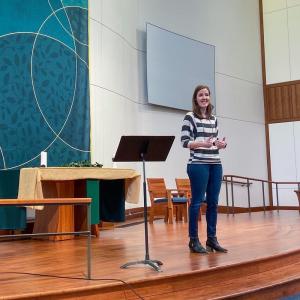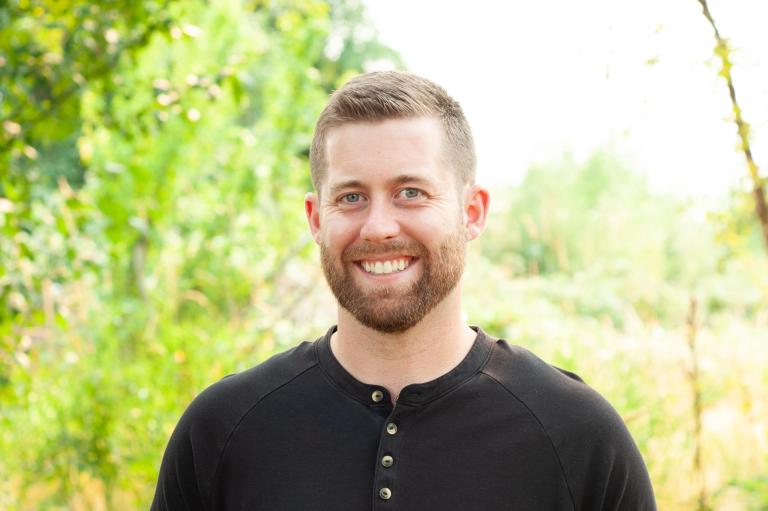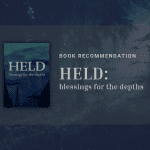At the beginning of 2020, I had the immense honor of speaking at the UMC LEAD Conference, mere months before our lives were upended by the COVID-19 Pandemic. I spoke on the impact of small group settings and communities with no idea that I would soon be unable to meet in those kinds of spaces for more than a year.
During the event, I also had the chance to listen to my friend Jenny Smith present on embodying a “palms up” stance in the world. Jenny is a writer, pastor, and all around amazing and kind human, making her way here in the Pacific Northwest. I recently connected with her and was able to ask some questions about what this palms up life really means for her.

Palms Up
Andy: How would you describe Palms Up to someone who’s never heard of your work before?
Jenny: Palms up is an intentional rhythm that leads to trust and freedom. It’s a contemplative rhythm that holds our lives, gives us structure, and a framework. It can be used in any situation, at any time. People practice in their relationships, when they get stuck at work, in a confusing parenting situation, when an identity is shifting, or when facing an uncertain situation.
A palms up rhythm invites us to:
- show up,
- pay attention,
- cooperate with God,
- and release the outcome.
First, we show up to our lives, mess and all. We show up to what we’d rather ignore. We choose to stop hiding.
Second, we pay attention to what’s going on around us. We notice what’s being said and not being said. We become expert noticers.
Third, we cooperate with God. Love is already at work all around us. We’re not bringing God to people. We notice Love is already at work and we choose to cooperate.
Last, we release the outcome. We let go of needing to know or force outcomes. We trust that Love is holding it, and that’s enough. Love gets more room to work. This doesn’t mean we abdicate responsibility and advocacy, but that we hold it in tension with the temptation to control people and situations.
Andy: You’ve written a “Palms Up Manifesto” that adds some detail to these four steps. And in it, you write,
“We are not defined by our metrics and numbers and stats. Our worth isn’t hidden in our latest greatest idea. We are already loved.”
For someone having a hard time with that part – feeling “already loved” – how might they tap into that for themselves?
Jenny: Beautiful question. It’s really what it is to be human, isn’t it? If the energy humming through the world seeks to name every human as good and loved, how do we embody that truth, when much of life sends us a different message?
Sometimes I look at it this way. Do we prefer the easy story or the true story? It’s not this simple, but I’ve found it a helpful place to start.
The true story is our belovedness. The easy story is, well, everything else. I’m always curious what someone’s daily rhythms look and feel like. Is there a spaciousness that’s intentionally built into one’s life that makes room to notice the story of belovedness? It’s a hard story to hear when life is loud and busy. When we’re overcommitted and rushed, we believe the easy story. The easy story is whatever voice is the loudest at that moment. It may be a mistake we made at work, anxiety we pick up from the news, content we watch on social media, or our own unhealed trauma that constantly whispers at us.
Palms up gives us an invitation to pause and breathe, regardless of the situation we find ourselves in. Right here, right now, can I show up? Do I want to pay attention? Okay, well, then I’m on my way to some new wisdom. And often, a new way to see my belovedness.
Andy: How did you come to this? What in your story led you to this kind of approach to life?

Jenny: I grew up as an anxious child, always looking for ways to earn love and keep others happy. I didn’t know there were other ways to live until my late 20s & early 30s.
My anxiety morphed and grew more sophisticated as I grew up, but she was never far away. I got married, became a United Methodist pastor, had two children, while trying to keep anxiety at bay.
I started getting panic attacks while preaching and knew it was time to face the source of this destructive fear. Working with therapists and spiritual directors for the past seven years gave me space to question the fear. I developed an intimate relationship with fear and learned to listen to it.
Turns out she just wanted my attention. The palms up rhythm taught me it was safe to trust what was inside myself, even when anxiety wreaked havoc on my health and well-being. I knew I could keep showing up, paying attention, cooperating with God and releasing the outcome. That rhythm became my life breath as I continued to offer compassion to my fear.
I started talking about it with other people and saw their curiosity light up. So now I love spending time with people in an online class, a retreat setting, a guest preaching opportunity, or in a bi-weekly email newsletter, exploring the palms up life and how it might serve peoples’ freedom and growth.
Embodied Spirituality
Andy: Learning to encounter your inner life like this – it seems like it’s really all about becoming more and more embodied: recognizing what’s happening within yourself. What does this kind of embodied spirituality mean to you?
Jenny: An embodied spirituality is an ethos and practice infused with fresh air, because it draws from a source outside our own stale air of long-held opinions and best practices.
I spent too many years looking for the book of rules and best practices for whatever position I was in. I’m an Enneagram One and wanted to do the thing correctly so I would be good. But whenever I looked at someone else’s playbook and tried to embody their knowing, I didn’t get very far. Sure, I gleaned a few things from other people’s wisdom. But it didn’t get me closer to an embodied spirituality where Spirit could dance and whisper in, through, and in spite of me.
One Sunday morning I stood in the front row of our sanctuary getting ready to offer my parts in worship facilitation, and I heard God’s voice break through my busyness: “Dear One, I need so little of you to do my work.” I felt annoyed. Then relief. Then freedom. This whole thing isn’t actually dependent on me.
Believing this, over and over, leads to a spirituality with lots of room to simply exist. To listen, to wonder, to notice. It leads me on adventures I would never have found on my own. This is a knowing far beyond what my brain could ever create.
Andy: Thank you so, so, so much for offering your time to this and being so vulnerable and true. If someone wants to participate in or support your work, where can they find you?
Jenny:
- I blog at www.jennysmithwrites.com.
- Learn more about the palms up life at www.palmsup.co. We’re having a ton of fun offering the Palms Up Path to groups and faith communities. Message me at [email protected] to learn more!













